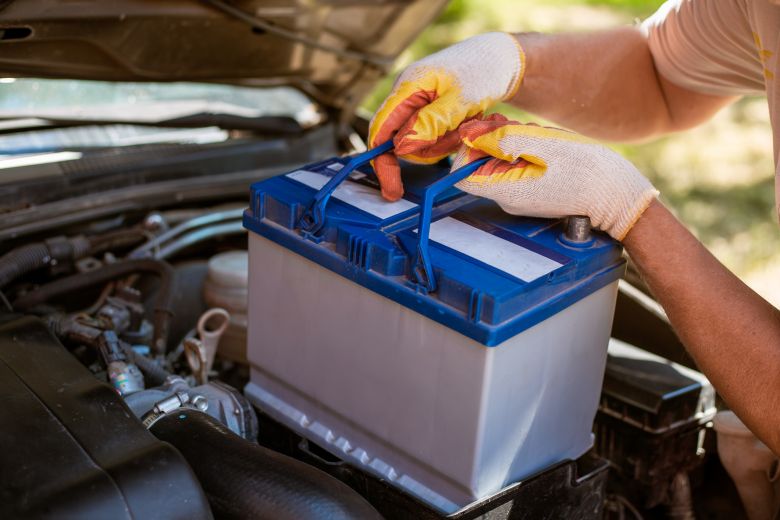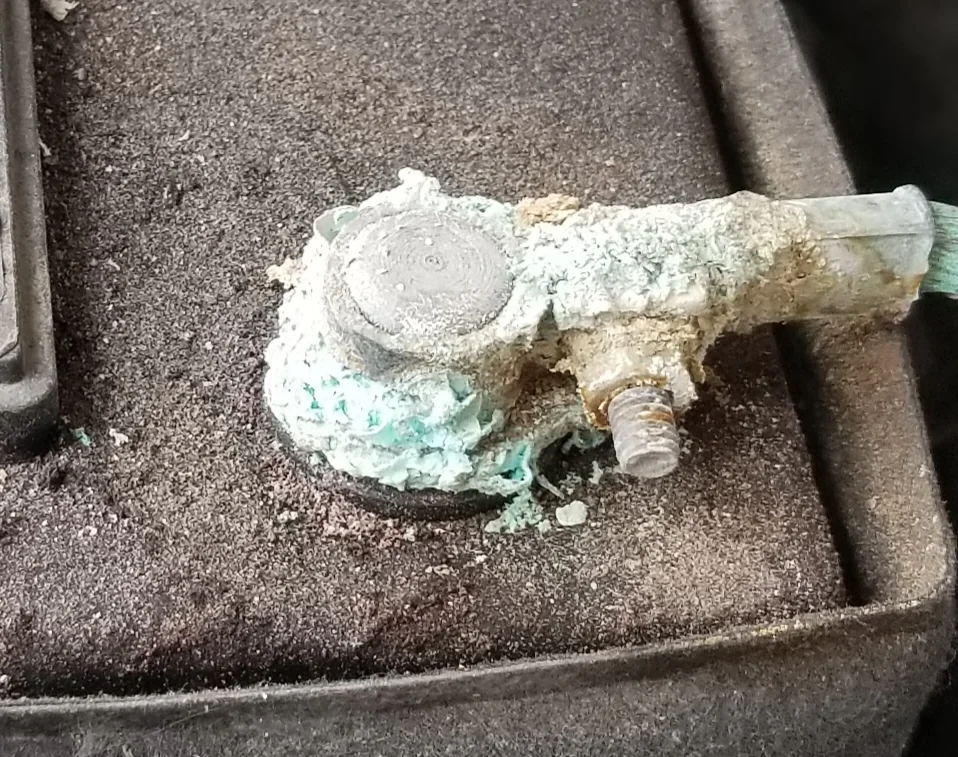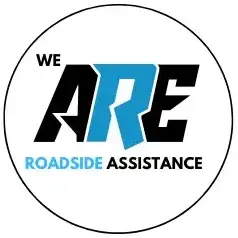

At ARE Roadside Assistance, we understand that a dead car battery can be a major inconvenience. That’s why we offer a comprehensive mobile car battery replacement service that comes to you, wherever you are. With over 1,500 car, truck and RV battery installations, you can trust us to get the job done right.
Our skilled technicians bring the power back to your vehicle with top-quality car batteries and a full reset of your Battery Management System (BMS) if your car requires it, ensuring your car runs smoothly from the moment you turn the key.
The technician will have all the necessary tools to install and test your battery. We also test the alternator and starter. If your car battery tests as good or if you have a bad alternator or starter, we will only charge you a small $39 Battery Check Up Service fee. We don’t want to sell you a car battery if you don’t need one.
(*Service available between 8 am and 8 pm. Passenger vehicles and light trucks only. Battery plus installation price varies based upon your specific vehicle requirements. Call for quote)
Includes Battery with a 2-3 Year Performance Warranty, Delivery, Standard Installation & Electrical System Test

When you’re considering the cost of replacing your car battery, it’s essential to compare not just the price, but also the convenience. Here’s how our service measures up against traditional auto parts stores:
In short, while auto parts stores may offer a comparable price on the battery itself, our service delivers unmatched convenience by bringing the store to your doorstep. Why settle for less when you can enjoy the ease of a mobile solution? At ARE 24/7 Roadside Assistance, we’re your trusted partner for professional car battery replacement and installation services in Denton county.
Our Mobile Battery Replacement Process goes above and beyond with:
A car battery is the lifeline of your vehicle, powering all critical systems like ignition, fuel delivery, navigation, and climate control. Even minor electrical fluctuations can cause disruptions. With our reliable car battery replacement service in Denton county, you can ensure longer performance and avoid unexpected inconveniences.
Not sure if you need a new battery? No problem, schedule a Mobile Battery Check Up Service and we’ll let you know.
For just $39 our expert technicians will:
If a battery replacement is needed, there’s no extra charge because the cost of the service complimentary with every battery installation.
Battery terminal corrosion is commonly seen as a white-blue or greenish powder that gathers around the positive- and negative-battery posts. The corrosion is generally caused by hydrogen gas (which is released from the battery while charging), along with moisture and other salts / minerals in the atmosphere, all of which combine to create a corrosive environment.
In many cases, it’s believed that the corrosion will typically form around the negative terminal, which suggests that the battery is “undercharging” due to a lack of adequate driving time. Corrosion around the positive terminal is generally believed to be the result of overcharging from the alternator.
Either way, any form of battery terminal corrosion will eventually lead to poor conductivity, high electrical resistance, reduced lifespan, and ultimately the inability to deliver enough energy to start the engine.
The color of corrosion doesn’t say much about the performance of the car battery or your car’s charging system. Instead, the presence of corrosion itself is a sign that your battery drained and recharged a significant amount of power recently.
Battery-terminal corrosion is a leading cause of vehicle hard starting. Fortunately, it’s also one of the easiest and most affordable problems to fix.

Many drivers mistakenly view the car battery as a maintenance-free component, operating under the assumption that a vehicle either starts or it doesn’t. If a vehicle fails to start, the solution is often seen only as a jump start or battery replacement. This article provides a comprehensive guide on how to maintain your car battery and the signs indicating it might be dying.
While you can clean up battery corrosion yourself, it’s not recommended. You’ve seen it on the internet so why not? Well, while cleaning a car battery with Coke might seem like an easy solution, but it’s just as likely to bring in new problems. Coke can leave a brown, gummy residue in the battery compartment and other car parts. That residue on sensitive wiring, a timing belt, etc., can interfere with high-performance car parts. Also, if any amount of Coke gets into the car battery, that tasty drink can interrupt the sensitive chemistry inside.
Even the Coca-Cola company agrees, the soda is better for drinking than for cleaning car batteries. If price is an issue, get some baking soda and water. If Coke seems easier, remind yourself that trying to diagnose new problems after pouring Coke in your engine compartment could be much harder.
Whether there’s trace amounts of battery acid or merely corroded metal, the ashy, powdery corrosion on the terminals will irritate your eyes and skin. That’s why our technicians are always equip themselves with protective gear of some kind before handling batteries. They use nitrile gloves to protect their hands, and safety glasses to protect their eyes. They also wear masks and try to ensure they’re working in a well-ventilated area to keep from inhaling stray particles of corroded metal.
If you do accidentally touch battery corrosion, run water on your skin for 30 minutes and use baking soda to neutralize any caustic substances that might be on your skin.
Chemical cleaners: Many brands are available, and you can easily find options at auto parts stores or a retailer with an automotive department. Generally, you spray the cleaner onto the terminals and cables and wipe the corrosion away. Directions for each brand are different so please take a moment to read and follow as recommended.
No, corrosion itself does not mean a car battery is bad. It just means you need to take a closer look. Corrosion is a sign that your car battery was recharging while hot and potentially in a poorly ventilated area, like a tight space under a car hood. However, if the battery needed to be recharged, it was drained. Also, draining a battery for too long can damage a car battery, right? Corrosion is a good example of correlation but does not mean causation.
Often, you can clean corrosion off a battery and expect it to last several more years. Corrosion, if thick enough, can keep your car from starting and keep the battery from getting recharged. Corrosion alone does not mean a battery has gone bad. It may be a sign that your alternator is overcharging the battery, or there may be a small enough crack in the battery case near a terminal to let a few drops of battery acid corrode the posts. You may find some corrosion that was caused by charging in high temperatures a year ago, and the battery’s just fine today.
The only way to know if your battery is weak, needs servicing or replacement is with a Battery Check Up or charging system test.
Yes, battery terminal corrosion is preventable through a combination of preventative measures and routine maintenance. By taking steps to protect the terminals, you can minimize or eliminate corrosion buildup.
Felt battery washers are an effective way to prevent corrosion by absorbing battery acid vapors before they can reach the terminals. These washers are chemically treated to neutralize the acid at the base of the battery posts. Keep in mind that felt washers don’t last forever. Over time, they lose their ability to absorb vapors, but they typically provide protection long enough to last through a battery’s lifespan.
Battery terminal grease creates a protective barrier that prevents corrosion by keeping out moisture, acid, and dirt. Silicone-based grease is ideal for this application as it lasts longer and withstands high under-hood temperatures better than petroleum-based products like petroleum jelly. After installing felt washers, apply a thin layer of silicone grease to the top of each washer and the battery terminals. For side-post batteries, apply the grease directly to the terminal and inside the bolt holes to prevent acid leaks and bolt seizing.
Extreme temperatures can affect your battery’s performance and lifespan. In colder months, use an insulation blanket to protect the battery from freezing temperatures. Conversely, in extreme heat, park your car in shaded areas or garages to keep the battery cool.
Avoid short trips – Your car battery will recharge as you drive. How long it will take for a full recharge depends on a range of factors, such as the percent of charge after starting, battery health, the amperage produced by the alternator, and the number of your car’s accessory systems that are running. Short trips often don’t allow your car’s alternator enough time to fully recharge your battery. At least once a week take a 20-30 minute drive to ensure your battery is recharged.
At least twice a year, check your battery for signs of corrosion or wear, especially in areas with extreme temperatures or high humidity. If you notice any buildup, clean the terminals and reapply terminal grease to boost the protection level again.
Keep your battery charged – A trickle charger is a low-amperage device that keeps your battery charged by supplying a consistent charge over a longer period. It can be useful for vehicles that are not driven regularly or are stored for extended periods. Be certain to do research on the device and proper usage before utilizing this charger.
Denton – Corinth – Krum – Sanger – Ponder – Northlake – Justin – Roanoke – Trophy Club – Keller – Haslet – Grapevine – Coppell – Lewisville – Colleyville – Addison – Hebron – The Colony – Frisco – Oak Point – Little Elm – Hackberry – Cross Roads – Providence Village – Krugerville – Aubrey – Prosper – Savannah – Paloma Creek – Bedford – Euless – North Richland Hills – Haltom City – Watauga – and surrounding areas.
